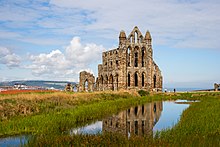Hilda of Whitby
Hilda von Whitby (also Hild , Hilde or Hildis ; * 614 in Northumbria , England , † November 17, 680 in Streaneshalch ) was an English monastery founder. She is venerated as a saint .
Life
Hilda was born around 614. Hereric father was a nephew of King Edwin of Northumbria . Her mother's name was Breguswith. She was related by marriage to the East Anglian royal family through her sister Hereswitha . She was baptized by Bishop Paulinus of York in 627 when King Edwin and his family became Christians.
At the age of 33 Hilda decided to go to the Franconian monastery Chelles , where her sister Hereswitha was already a nun. Aidan of Lindisfarne convinced them to stay in Northumbria. He made a piece of land available to her near Wearmouth , where she led a monastic life with a few like-minded people.
Then Hilda entered the Heruteu ( Hartlepool ) monastery , of which she became abbess around 649. In the year 657, she founded the double monastery Streoneshalch , today Whitby Abbey . Both men and women lived in this, with the quarters adjoining each other and Hilda having overall management. Hilda paid special attention to a comprehensive education for men and women beyond the theological and philosophical disciplines, making the Streoneshalch monastery one of the most important religious centers in England. Five later bishops, Bosa , Ætla , Oftfor , John von Beverley, and Wilfrid II , were trained in Whitby under Hilda's leadership. Cædmon was a monk in Whitby and is said to have been entrusted with the herding of Hilda's pigs. His hymn of creation is the oldest extant poem in the Old English language .
It was in this monastery that the Synod of Whitby took place in 664 , where it was decided whether Northumbria should take the form of the tonsure and the date of Easter from the Celtic or Roman tradition. The synod opted for the Roman tradition, which resulted in a rapprochement between the local church and Rome. Hilda preferred the Celtic tradition she had lived in, but once the decision was made, she used her leverage to achieve a peaceful transition. In the course of this she introduced the Roman liturgy and the Regula Benedicti (Benedictine rule). Hilda died on November 17, 680 in Whitby Abbey after a six-year illness.
Adoration
The calendar of St. Willibrord , which was made at the beginning of the 8th century, is the oldest written record that mentions the veneration of Hilda. The main source of their life is the Church history of Bede .
Hilda's feast day is in the Roman Catholic Church on November 17 , in the Anglican Church on 19 November .
swell
- Beda Venerabilis : Historia ecclesiastica gentis Anglorum , Online in the Medieval Sourcebook (English)
literature
- Michael Lapidge: Hild ; In: Michael Lapidge, John Blair, Simon Keynes, Donald Scragg (Eds.): The Blackwell Encyclopaedia of Anglo-Saxon England . Wiley-Blackwell, Oxford et al. a. 2001, ISBN 978-0-631-22492-1 , p. 239.
- S. Brechte: Hild (a) . In: Josef Höfer , Karl Rahner (Ed.): Lexicon for Theology and Church . 2nd Edition. tape 5 . Herder, Freiburg im Breisgau 1960.
- Friedrich Wilhelm Bautz : Hilda, saint. In: Biographisch-Bibliographisches Kirchenlexikon (BBKL). Volume 2, Bautz, Hamm 1990, ISBN 3-88309-032-8 , Sp. 842-843.
- St. Hilda . In: Catholic Encyclopedia , 1913 ( Wikisource )
Web links
- Hild 1 in Prosopography of Anglo-Saxon England (PASE)
Individual evidence
- ↑ a b c Beda: HE 4.23
- ↑ a b c Michael Lapidge: Hild . In: Michael Lapidge, John Blair, Simon Keynes, Donald Scragg (eds.): The Blackwell Encyclopaedia of Anglo-Saxon England , Wiley-Blackwell, Oxford a. a. 2001, ISBN 978-0-631-22492-1 , p. 239.
- ^ Friedrich Wilhelm Bautz: Hilda, saints. In: Biographisch-Bibliographisches Kirchenlexikon (BBKL). Volume 2, Bautz, Hamm 1990, ISBN 3-88309-032-8 , Sp. 842-843.
- ↑ Beda HE III 24f, IV 23f, V 24
- ↑ Hilda von Whitby at heiligenlexikon.de
| personal data | |
|---|---|
| SURNAME | Hilda of Whitby |
| ALTERNATIVE NAMES | Hild; Hilda; Hilde; Hildis; Hylda; Ild |
| BRIEF DESCRIPTION | English founder of a monastery |
| DATE OF BIRTH | 614 |
| PLACE OF BIRTH | Northumbria , England |
| DATE OF DEATH | 17th November 680 |
| Place of death | Streoneshalch ( Whitby Abbey ) |
